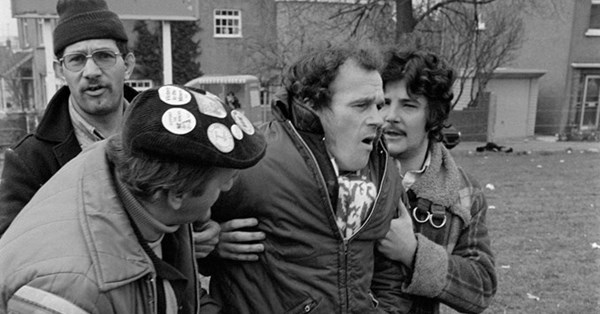BBC Radio Wales’s All Things Considered (Sunday) explored the part played by churches in the principality during the miners’ strike, noting that the National Museum’s current exhibition, “Strike!”, pays considerable attention to the actions of various social groups but ignores churches and chapels entirely.
The curator of the Welsh National Coal Museum, Ceri Thompson, said that “unfortunately” the Welsh chapel tradition “was starting to slip” at the time of the strike. Yet the social capital embodied by that tradition still made a difference to many miners’ families. Ruth Morgan, the daughter of a striking miner who was a lay leader in a Pentecostal church, reported members of their congregation quietly supplying cash to buy her new shoes and keep the family above the breadline.
The most interesting contribution was from a then-teenage son of a striking miner and later Plaid Cymru leader, Adam Price MS. An enthusiastic schoolboy Evangelical, he was something of a young star turn on the South Wales Gospel Hall circuit, even preaching with a loudhailer on the streets of Swansea. During the strike, as a self-described “angry young man”, Price recoiled from what he saw as the political quiescence of the Evangelical leadership, starting a process that led him to outright atheism. One could perhaps also detect Welsh nationalism supplying some of the emotional energy once provided by Christianity.
The programme’s weakness was its assumption that everyone supported the strike. Yet, at the time, the Archbishop of Wales wrote to Robert Runcie distancing himself from a “radical and somewhat irresponsible strain of Welsh Nonconformity”.
The irony is that the very different dreams of the future held by Margareth Thatcher and the unions were both undone by the atomisation of society already starting to disintegrate the communities of Welsh chapels.
In Beyond Belief (Radio 4, Tuesday), Canon Giles Fraser explored one of the consequences of that more individualistic and pluralistic society: a great rise in the number of interfaith marriages. Canon Fraser sees his own mixed Christian-Jewish family as a great blessing, and the same was true of others — Christians, Muslims, and Hindus — participating in the panel discussion or interviewed for the programme. Others, however, were clearly put under terrible pressure by families or religious authorities.
There was a time when inter-Church marriages provoked some pretty despicable bullying and pressure from denominations, and it is sad to see the same chauvinism recapitulated in a fresh context.
In particular, the prohibition on Muslim women marrying non-Muslim men, reported as unanimous opinion among Muslim jurors by a Leicester imam, Ibrahim Mogra, seems particularly problematic in the present UK context. Some Muslim women who have married outside the faith have been disowned by their families — behaviour that Mr Mogra seeks to discourage, even as he upholds the ban.
















